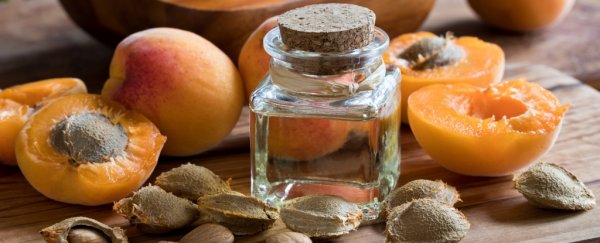A seemingly healthy 67-year old Australian man developed cyanide poisoning after ingesting apricot kernel extract.
The man in this case was making his own extract, and consuming two teaspoons of it daily, in addition to taking a commercial fruit kernel supplement called Novodalin. He had had prostate cancer, which had gone into remission.
"The gentleman involved has a scientific background and he had read that apricot kernel extract would prevent his cancer from recurring," his anaesthetist, Alex Konstantatos, told The Huffington Post.
Apricot kernels have been widely publicised as a miracle cancer cure on and off since the 1950s. They contain a compound called amygdalin, which can be partially synthesised into laetrile.
When we ingest amygdalin or laetrile, our digestive bacteria and food enzymes break them down into cyanide, a toxic chemical that in sufficient doses prevents the body's cells from using oxygen, which in turn kills them.
Proponents of apricot kernel oil as a cancer treatment mistakenly believe that this cyanide only targets cancer cells, and is therefore safe to consume. But up-to-date clinical research shows no beneficial effect to using amygdalin or laetrile to treat cancer.
It is safe to consume cyanide below, but only below a very small threshold. Our bodies can safely metabolise a tiny amount into thiocyanate, which is then expelled in urine.
Unfortunately, over the years there have been multiple cases of fatal cyanide poisoning following the consumption of apricot kernels as an alternative medicine.
The doctors found the thiocyanite in this patient's blood when they noticed him having abnormally low levels of oxygen during a routine surgery under general anaesthesia. His blood was sent off and tested for cyanide, and he informed them that, for five years, he had been consuming apricot kernel extract.
Ingesting the extract through both tablets and homemade extracts, the man was taking in nearly 17.32 milligrams of cyanide every day - enough to raise blood cyanide to around 25 times above acceptable levels.
The sale of raw apricot kernels as food has been banned in Australia since December 2015, but it is still possible to obtain them from overseas, and laetrile and amygdalin can be bought online as " vitamin B17", although it is technically not a vitamin.
According to the case study, the doctors requested that the patient cease taking the extracts for three days, whereupon his blood oxygen levels returned to normal. However, after that he decided to continue taking the extracts.
"Despite conveying our concerns regarding the continued ingestion of ake [apricot kernel extract] and being satisfied that our viewpoint was understood, the patient elected to continue self-administering ake," the doctors wrote.
With up to two thirds of Australians using complementary medicines, it's important to know how their use can present certain symptoms, and how they can interact with medical interventions, the researchers note.
"This case illustrates how chronic dosing of complementary medicines can result in harmful toxicities, which may carry potential for serious consequences and how these chronic toxicities may present to physicians in atypical ways."
The case study was published in the journal BMJ Case Reports.
